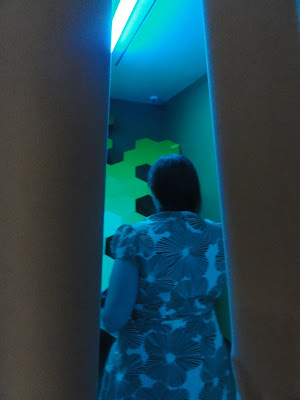A VISUAL JOURNAL: Pluck the day when it is ripe, trusting as little as possible to the future.
Friday, July 6, 2012
RHODE ISLAND SCHOOL OF DESIGN - SPENCER FINCH PRESS RELEASE:
The work of Impressionist painter Claude Monet
(French, 1840-1926) serves as the aesthetic
touchstone for both parts of the exhibition, and even
informed its title. Painting Air comes from a
statement Monet made in 1895: “I want to paint the
air… and that is nothing short of impossible.” Finch’s
new installation, Painting Air (2012), created for the
exhibition, seeks to capture the movement and reflection the artist observed in a recent visit to Monet’s water
garden in Giverny. For both Finch (RISD MFA ’89) and Monet, the pond at Giverny served as a laboratory in
which they merge the experience of nature with the art-making process. Finch evokes his experience by
suspending more than 100 transparent and highly reflective glass panels, surrounded by an expansive, 150-
linear-foot mural comprised of 34 colors. Light and color shift across the surfaces of the gently swaying panels,
reflecting the painting and the movements of visitors, and transforming viewers’ perspectives from one moment
to the next.
“As abstract and ephemeral as some of Finch’s projects appear to be, they are based in fact and scientific
phenomena. He acutely observes natural occurrences, which he then filters through memory as well as literary,
artistic, and scientific accounts. The results are often poetic, as he tries to make visible what cannot easily be
seen,” says Judith Tannenbaum, Richard Brown Baker Curator of Contemporary Art.
An ice machine produces ice, which slowly trickles into a pool of water. Oddly enough, it is quite calming.
(See description below)
A hive-like infrastructure is illuminated with black lights.
Glass suspended from the center of the room picks up its surroundings and gives the sense that the work is constantly in flux.
Subscribe to:
Post Comments (Atom)









So cool. I especially like the glass and Monet exhibits. (pretty colors!)
ReplyDeleteYeah - in some ways, Spencer did succeed in "painting" air.
ReplyDeleteBut let me count the ways he failed: great concepts, mostly poor execution!
ReplyDelete